2021 NCWIT AspireIT Impact Award Recipients
 The NCWIT AspireIT Impact Award honors Aspirations in Computing (AiC) Community women, genderqueer, or non-binary members for their incredible work to ultimately encourage K-16 girls to contribute their unique perspectives and ideas to future innovations. Award recipients are selected based on their efforts to build and creatively offer hands-on learning opportunities in computing and career exploration, and to bring together advocates and allies of various backgrounds through computing-related events and community groups.
The NCWIT AspireIT Impact Award honors Aspirations in Computing (AiC) Community women, genderqueer, or non-binary members for their incredible work to ultimately encourage K-16 girls to contribute their unique perspectives and ideas to future innovations. Award recipients are selected based on their efforts to build and creatively offer hands-on learning opportunities in computing and career exploration, and to bring together advocates and allies of various backgrounds through computing-related events and community groups.
Learn about all of the 2021 NCWIT AspireIT Impact Award recipients here or jump to a specific recipient by clicking on their name below.
About the 2021 NCWIT AspireIT Impact Award Recipients
Oluwadamilola (Damilola) Awofisayo
 Oluwadamilola Awofisayo is the co-founder and executive director of TecHacks, a nonprofit organization that hosts programs and initiatives to promote underrepresented women in computer science. For example, a TecHacks hackathon offered interdisciplinary competitions that encouraged participants to merge their own passions with computer science. In categories such as social justice, education, and environment, people with different backgrounds came together to propose and build innovative solutions relating to these topics. TecHacks has worked with more than 25 tech companies, which not only helps participants to envision themselves in tech careers, but also shows the companies the impact of young women in technology.
Oluwadamilola Awofisayo is the co-founder and executive director of TecHacks, a nonprofit organization that hosts programs and initiatives to promote underrepresented women in computer science. For example, a TecHacks hackathon offered interdisciplinary competitions that encouraged participants to merge their own passions with computer science. In categories such as social justice, education, and environment, people with different backgrounds came together to propose and build innovative solutions relating to these topics. TecHacks has worked with more than 25 tech companies, which not only helps participants to envision themselves in tech careers, but also shows the companies the impact of young women in technology.
Lidya Demilew
 Lidya Demilew used a grant from the Society of Women Engineers (SWE) to host STEM Into Spring, an engineering workshop for the low-income elementary schools in her community. Each engineering and computing activity was taught by an all-female team of middle and high school students. She also runs a robotics workshop in which students learn how to program Spero robots to automatically navigate an obstacle course. She co-hosted a virtual seminar on AI and cybersecurity, and her screening of the film "Coded Bias" led to an international collaboration between the STEM Impressionists and a school for girls in Senegal.
Lidya Demilew used a grant from the Society of Women Engineers (SWE) to host STEM Into Spring, an engineering workshop for the low-income elementary schools in her community. Each engineering and computing activity was taught by an all-female team of middle and high school students. She also runs a robotics workshop in which students learn how to program Spero robots to automatically navigate an obstacle course. She co-hosted a virtual seminar on AI and cybersecurity, and her screening of the film "Coded Bias" led to an international collaboration between the STEM Impressionists and a school for girls in Senegal.
Nardos Demilew
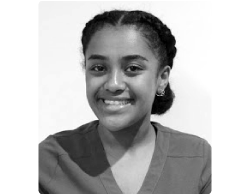 Nardos Demilew served as campus ambassador for Technica, the world’s largest hackathon for women and nonbinary participants, where she communicated with Technica’s brand team, helped spread awareness about inclusivity in STEM, and encouraged students to participate in the hackathon. She collaborated with her peers to create an AspireIT program called HackSIP, a beginner hackathon for minority middle and high school girls, where she taught programming with the Micro:Bit device. In addition, Nardos collaborated with her team to forge an international partnership with an organization in India and hold a 10-week online Scratch course called Starting From Scratch.
Nardos Demilew served as campus ambassador for Technica, the world’s largest hackathon for women and nonbinary participants, where she communicated with Technica’s brand team, helped spread awareness about inclusivity in STEM, and encouraged students to participate in the hackathon. She collaborated with her peers to create an AspireIT program called HackSIP, a beginner hackathon for minority middle and high school girls, where she taught programming with the Micro:Bit device. In addition, Nardos collaborated with her team to forge an international partnership with an organization in India and hold a 10-week online Scratch course called Starting From Scratch.
Roma Desai
 Roma Desai volunteered as a mentor in a series of computing programs for girls from rural schools after she experienced gender bias and discrimination within her robotics team. She went on to lead a two-month program for girls, called Tech Savvy, in collaboration with the American Association of University Women (AAUW). Tech Savvy served as a pilot for the AspireIT program, Girls Code the Web, which has had participants from Center for New North Carolinians, a refugee organization, and from across the East Coast. Roma also founded a Data Analytics and Cybersecurity club to raise awareness about the cybersecurity field.
Roma Desai volunteered as a mentor in a series of computing programs for girls from rural schools after she experienced gender bias and discrimination within her robotics team. She went on to lead a two-month program for girls, called Tech Savvy, in collaboration with the American Association of University Women (AAUW). Tech Savvy served as a pilot for the AspireIT program, Girls Code the Web, which has had participants from Center for New North Carolinians, a refugee organization, and from across the East Coast. Roma also founded a Data Analytics and Cybersecurity club to raise awareness about the cybersecurity field.
Aya Elfettahi
 Aya Elfettahi is a founding member of The STEM Impressionists (SIP), a sustained mentoring program that provides hands-on participatory opportunities for middle and high school minority women to develop their STEM, leadership, and entrepreneurial skills. Aya’s SIP cohort facilitated a STEM camp for girls called BRIGHT-CS, for which Aya created curricula. The camp’s objective was to encourage girls from underrepresented groups to explore technical fields. Inspired by a mentor to learn more about cybersecurity, Aya would like to continue developing her expertise in this area and eventually design a cybersecurity-focused event for younger students.
Aya Elfettahi is a founding member of The STEM Impressionists (SIP), a sustained mentoring program that provides hands-on participatory opportunities for middle and high school minority women to develop their STEM, leadership, and entrepreneurial skills. Aya’s SIP cohort facilitated a STEM camp for girls called BRIGHT-CS, for which Aya created curricula. The camp’s objective was to encourage girls from underrepresented groups to explore technical fields. Inspired by a mentor to learn more about cybersecurity, Aya would like to continue developing her expertise in this area and eventually design a cybersecurity-focused event for younger students.
Tanvi Ganapathy
 Tanvi Ganapathy leads the Women in Science and Engineering club at her school, in which high school students guide middle school students through STEM experiments, offering an opportunity for mentorship and encouraging younger students to persist in STEM. Tanvi pioneered an extension of the club that creates an affinity space for high school students, with a forum for peer mentorship, homework support, and discussion around diversity in STEM. To extend these opportunities beyond her school community, she developed a curriculum for high school girls titled “Introduction to Computational Thinking.” Partnering with Black Girls Code allowed Tanvi to bring the workshop to a wider audience.
Tanvi Ganapathy leads the Women in Science and Engineering club at her school, in which high school students guide middle school students through STEM experiments, offering an opportunity for mentorship and encouraging younger students to persist in STEM. Tanvi pioneered an extension of the club that creates an affinity space for high school students, with a forum for peer mentorship, homework support, and discussion around diversity in STEM. To extend these opportunities beyond her school community, she developed a curriculum for high school girls titled “Introduction to Computational Thinking.” Partnering with Black Girls Code allowed Tanvi to bring the workshop to a wider audience.
Joyce Garofalo
 Joyce Garofalo wanted to teach kids about computer science because many people in her area cannot afford after-school programs. She started a program called GCT, which teaches Latinx girls in grades 2 through 6 how to code using Scratch block programming. The program features a “family coding day,” when participants are encouraged to bring their siblings and parents to class for an introduction to programming. In addition, the program includes a career panel with women in STEM fields who talk about their jobs, opportunities in tech, and the relevance of computer science in daily life.
Joyce Garofalo wanted to teach kids about computer science because many people in her area cannot afford after-school programs. She started a program called GCT, which teaches Latinx girls in grades 2 through 6 how to code using Scratch block programming. The program features a “family coding day,” when participants are encouraged to bring their siblings and parents to class for an introduction to programming. In addition, the program includes a career panel with women in STEM fields who talk about their jobs, opportunities in tech, and the relevance of computer science in daily life.
Aroshi Ghosh
 Aroshi Ghosh created AISpectra as a way to introduce girls to computing at a young age. Goals of the program include educating students on the applications of emerging technologies like AI and Blockchain, building their confidence through a supportive community, and integrating the humanities and the sciences in the curriculum. As a national student-run organization, AISpectra has collaborated with industry and community sponsors to secure funding, which allows them to deliver the program tuition-free to participants that need it the most. AISpectra hosts speaker panels, Kaggle competitions, and mentorship sessions, and offers college and career resources for participants.
Aroshi Ghosh created AISpectra as a way to introduce girls to computing at a young age. Goals of the program include educating students on the applications of emerging technologies like AI and Blockchain, building their confidence through a supportive community, and integrating the humanities and the sciences in the curriculum. As a national student-run organization, AISpectra has collaborated with industry and community sponsors to secure funding, which allows them to deliver the program tuition-free to participants that need it the most. AISpectra hosts speaker panels, Kaggle competitions, and mentorship sessions, and offers college and career resources for participants.
Alyssa Ho
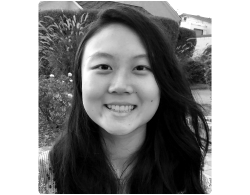 Alyssa Ho’s organization, Full STEAM Ahead, encourages girls to participate in competitive STEM teams. With their real-world applications and cooperative structure, such teams can be an ideal way to get students inspired about STEM topics. The organization offers live workshops as well as a mobile app that connects students, mentors, and STEM teams based on their location and other preferences, making communication between teams and interested applicants and mentors easier and more accessible. An online, international hackathon sponsored by Full STEAM Ahead brought together 13 judges and 100 girls from more than 11 countries.
Alyssa Ho’s organization, Full STEAM Ahead, encourages girls to participate in competitive STEM teams. With their real-world applications and cooperative structure, such teams can be an ideal way to get students inspired about STEM topics. The organization offers live workshops as well as a mobile app that connects students, mentors, and STEM teams based on their location and other preferences, making communication between teams and interested applicants and mentors easier and more accessible. An online, international hackathon sponsored by Full STEAM Ahead brought together 13 judges and 100 girls from more than 11 countries.
Lauren Hu
 Lauren Hu founded Girl Code, a 13-week coding program for middle school girls. The mission of Girl Code is to assist in ending gender inequality in STEM by creating a sisterhood that empowers young women to pursue an interest in computer science. Participants learned three web-development languages (HTML, CSS, and Javascript) as well as how to amplify their voices to create real change through websites they made about social issues they are passionate about. The students also participated in sisterhood activities in every class, along with attending a weekly female-speaker series highlighting women in the technology industry.
Lauren Hu founded Girl Code, a 13-week coding program for middle school girls. The mission of Girl Code is to assist in ending gender inequality in STEM by creating a sisterhood that empowers young women to pursue an interest in computer science. Participants learned three web-development languages (HTML, CSS, and Javascript) as well as how to amplify their voices to create real change through websites they made about social issues they are passionate about. The students also participated in sisterhood activities in every class, along with attending a weekly female-speaker series highlighting women in the technology industry.
Megan Jacob
 Megan Jacob started Tech Girls United in order to connect students with female role models and a supportive learning community. The program has hosted multi-week boot camps on data science and web development featuring a curriculum created and taught by girls, for girls. Other events have focused on topics like UX design and fintech. A Slack community grew out of these sessions, and it now has more than 100 members who share computing opportunities and advice. Megan is also a creative director at Reinvented Magazine, supporting projects such as magazine creation and the Recognizing Reinventors awards.
Megan Jacob started Tech Girls United in order to connect students with female role models and a supportive learning community. The program has hosted multi-week boot camps on data science and web development featuring a curriculum created and taught by girls, for girls. Other events have focused on topics like UX design and fintech. A Slack community grew out of these sessions, and it now has more than 100 members who share computing opportunities and advice. Megan is also a creative director at Reinvented Magazine, supporting projects such as magazine creation and the Recognizing Reinventors awards.
Riana Karim
 Riana Karim started Code The Way, an after school program that teaches technology and computer science basics to high school students with developmental disorders (including autism, learning disabilities, and ADHD). By matching students either individually or in small groups with mentors and instructors who have experience and backgrounds in inclusive education for differently abled students, we are able to address the pipeline issue of not only increasing awareness for inclusion and equity for all groups in technology, but also empowering these often overlooked and misunderstood populations that contribute greatly to diversity of ability, thought, and perspective.
Riana Karim started Code The Way, an after school program that teaches technology and computer science basics to high school students with developmental disorders (including autism, learning disabilities, and ADHD). By matching students either individually or in small groups with mentors and instructors who have experience and backgrounds in inclusive education for differently abled students, we are able to address the pipeline issue of not only increasing awareness for inclusion and equity for all groups in technology, but also empowering these often overlooked and misunderstood populations that contribute greatly to diversity of ability, thought, and perspective.
Nishi Kaura
 Nishi Kaura decided to make a difference by starting ChiCode (“chica” = girl in Spanish + “code”), a nonprofit that provides free digital skills training to students of all backgrounds, after realizing she was one of only two girls in her school’s computer science club. Chicode offers online lessons, mentoring, and support for technical questions. The program also connects students with female technology leaders who can encourage participants to dream big. ChiCode is now established in Jamaica, the United States (California, Washington, Texas), Canada, and parts of India, and the program has supported more than 150 students.
Nishi Kaura decided to make a difference by starting ChiCode (“chica” = girl in Spanish + “code”), a nonprofit that provides free digital skills training to students of all backgrounds, after realizing she was one of only two girls in her school’s computer science club. Chicode offers online lessons, mentoring, and support for technical questions. The program also connects students with female technology leaders who can encourage participants to dream big. ChiCode is now established in Jamaica, the United States (California, Washington, Texas), Canada, and parts of India, and the program has supported more than 150 students.
Christin Lin
 Christin Lin worked with her twin sister to launch the STEM League Developer Program after many summer opportunities in her community were canceled due to the COVID-19 pandemic. This eight-week, free virtual coding program was designed to help underserved students in grades 6 through 10 develop technical skills to create personal projects. As the Program Manager and Lead Instructor, Christin recruited more than 50 college mentors and developed the program’s curriculum, including lessons, coding assignments, workshops, hosting industry career panels, designing coding competitions, and leading a virtual hackathon. The program inspired more than 300+ students to pursue computer science.
Christin Lin worked with her twin sister to launch the STEM League Developer Program after many summer opportunities in her community were canceled due to the COVID-19 pandemic. This eight-week, free virtual coding program was designed to help underserved students in grades 6 through 10 develop technical skills to create personal projects. As the Program Manager and Lead Instructor, Christin recruited more than 50 college mentors and developed the program’s curriculum, including lessons, coding assignments, workshops, hosting industry career panels, designing coding competitions, and leading a virtual hackathon. The program inspired more than 300+ students to pursue computer science.
Adriana Lopez Cajigas
 Adriana Lopez Cajigas is an active member of the STEM community of the Houston region. She started a mentor circle program which connects students with women in the tech industry. She also created a comic book about neuroscience, aimed at both young readers and general audiences. The comic book was developed in collaboration with the Brain-Machine Interface Lab at the University of Houston, and it showcases the various computing projects the BRAIN lab has to offer from the perspective of a young girl who is interested in STEM.
Adriana Lopez Cajigas is an active member of the STEM community of the Houston region. She started a mentor circle program which connects students with women in the tech industry. She also created a comic book about neuroscience, aimed at both young readers and general audiences. The comic book was developed in collaboration with the Brain-Machine Interface Lab at the University of Houston, and it showcases the various computing projects the BRAIN lab has to offer from the perspective of a young girl who is interested in STEM.
Ria Mirchandani
 Ria Mirchandani was the co-leader of an AI4ALL special interest group, in which she mentored five girls from 11th and 12th grades on a project that involved coding and comparing the performance of three image-recognition AI algorithms in classifying 6,400 MRI brain scans into categories based on the four stages of Alzheimer’s disease. She also volunteers for a non-profit organization, GatewayGIS, which organizes STEAM activities for minority students. In this role, she developed and taught a free online workshop titled “GatewayGIS Operation Girls in AI” for 10th and 11th grade girls from local minority-serving high schools.
Ria Mirchandani was the co-leader of an AI4ALL special interest group, in which she mentored five girls from 11th and 12th grades on a project that involved coding and comparing the performance of three image-recognition AI algorithms in classifying 6,400 MRI brain scans into categories based on the four stages of Alzheimer’s disease. She also volunteers for a non-profit organization, GatewayGIS, which organizes STEAM activities for minority students. In this role, she developed and taught a free online workshop titled “GatewayGIS Operation Girls in AI” for 10th and 11th grade girls from local minority-serving high schools.
Samina Mondal
 Samina Mondal took on the position of AspireIT student leader in 2018. She served as the main instructor for her program, CyberWeek; organized outreach efforts to encourage students and teachers to take part; communicated with DoD STEM professionals to invite them to participate in career exploration events; and utilized her position as an intern at the U.S. Naval Research Laboratory to build relationships with local schools and to expand DoD efforts in the Washington, DC area. In the future, Samina aims to bring CyberWeek programs to schools across the country to encourage students to pursue cybersecurity and DoD STEM fields.
Samina Mondal took on the position of AspireIT student leader in 2018. She served as the main instructor for her program, CyberWeek; organized outreach efforts to encourage students and teachers to take part; communicated with DoD STEM professionals to invite them to participate in career exploration events; and utilized her position as an intern at the U.S. Naval Research Laboratory to build relationships with local schools and to expand DoD efforts in the Washington, DC area. In the future, Samina aims to bring CyberWeek programs to schools across the country to encourage students to pursue cybersecurity and DoD STEM fields.
Tomi Oladeji
 Tomi Oladeji started STEAMKidz, a nonprofit organization that provides elementary and middle school students with opportunities to learn about STEAM subjects. STEAMKidz hosts public events in libraries and clubs, and holds online after-school programs in computer science. A big part of the program is mentorship, with guest appearances by women who work in STEAM fields at every event. Inviting people to talk about their jobs and industries gives the participants a chance to ask questions and learn about careers and opportunities that they might not have known about before. The STEAMKidz website also offers resources for elementary and middle school students.
Tomi Oladeji started STEAMKidz, a nonprofit organization that provides elementary and middle school students with opportunities to learn about STEAM subjects. STEAMKidz hosts public events in libraries and clubs, and holds online after-school programs in computer science. A big part of the program is mentorship, with guest appearances by women who work in STEAM fields at every event. Inviting people to talk about their jobs and industries gives the participants a chance to ask questions and learn about careers and opportunities that they might not have known about before. The STEAMKidz website also offers resources for elementary and middle school students.
Sanjitha Prabakaran
 Sanjitha Prabakaran is working to create opportunities in computing for underrepresented students through her STEM for Scouts program, her leadership in creating her high school’s Girls Who Code club, and her work with her school district’s CS Pipeline Initiative. Sanjitha partnered with the nonprofit organization Everybody Code Now! and local Girl Scout councils to found STEM for Scouts. The program hosts coding workshops and female guest speakers in tech to help Girl Scouts earn their “Coding for Good” badges. Over the past three years, Sanjitha has worked with 1,936 Girl Scouts and 264 troop leaders through 57 in-person and virtual workshops.
Sanjitha Prabakaran is working to create opportunities in computing for underrepresented students through her STEM for Scouts program, her leadership in creating her high school’s Girls Who Code club, and her work with her school district’s CS Pipeline Initiative. Sanjitha partnered with the nonprofit organization Everybody Code Now! and local Girl Scout councils to found STEM for Scouts. The program hosts coding workshops and female guest speakers in tech to help Girl Scouts earn their “Coding for Good” badges. Over the past three years, Sanjitha has worked with 1,936 Girl Scouts and 264 troop leaders through 57 in-person and virtual workshops.
Elizabeth Qiu
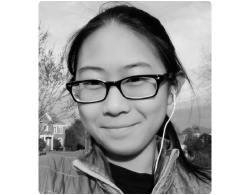 When Elizabeth Qiu joined the organizing team for her school district’s hackathon, she received a flood of messages expressing disbelief that a girl could code. Her reaction was “shock, curiosity, and a determination to learn more and prove the boys wrong.” She went on to lead the sponsorship, marketing, and design efforts for MoCoHacks in 2020 and 2021, reaching hundreds of faculty members and thousands of students, and garnering thousands of dollars in fiscal and in-kind sponsorships for the event. She also networked with tech professionals who served as speakers, mentors, and workshop leaders.
When Elizabeth Qiu joined the organizing team for her school district’s hackathon, she received a flood of messages expressing disbelief that a girl could code. Her reaction was “shock, curiosity, and a determination to learn more and prove the boys wrong.” She went on to lead the sponsorship, marketing, and design efforts for MoCoHacks in 2020 and 2021, reaching hundreds of faculty members and thousands of students, and garnering thousands of dollars in fiscal and in-kind sponsorships for the event. She also networked with tech professionals who served as speakers, mentors, and workshop leaders.
Erika Ramirez
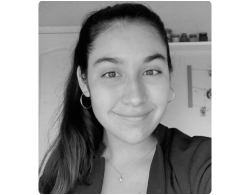 Erika Ramirez’s organization, TecHacks, aims to bridge the gender gap in computer science by hosting hackathons that offer women and nonbinary high school and college students opportunities to expand their coding skills, create innovative projects, and meet others who share their passion. The TecHacks fellowship program has provided ten teams with mentors and stipends to help them turn their computing project ideas into reality. In addition, the TecHacks outreach teams work hard to bring quality information regarding current STEM topics and opportunities to a mailing list of more than 1,000 people.
Erika Ramirez’s organization, TecHacks, aims to bridge the gender gap in computer science by hosting hackathons that offer women and nonbinary high school and college students opportunities to expand their coding skills, create innovative projects, and meet others who share their passion. The TecHacks fellowship program has provided ten teams with mentors and stipends to help them turn their computing project ideas into reality. In addition, the TecHacks outreach teams work hard to bring quality information regarding current STEM topics and opportunities to a mailing list of more than 1,000 people.
Anesha Santhanam
 Anesha Santhanam is the CEO and Founder of Likeable STEM, an educational company providing online and on-site technology training. Through her initiatives, Anesha aims to inspire, empower and educate all ages, genders, races, and financial backgrounds to learn STEM in a fun and interactive way. She has partnered with organizations such as ASCA, NCWIT Counselors for Computing, Girls Who Code, Cyber.org, Microsoft Digigirlz, and DoD STEM to provide workshops, be a guest speaker and role model, and introduce career pathways and technology tools for counselors and educators in order to encourage students to pursue a STEM career.
Anesha Santhanam is the CEO and Founder of Likeable STEM, an educational company providing online and on-site technology training. Through her initiatives, Anesha aims to inspire, empower and educate all ages, genders, races, and financial backgrounds to learn STEM in a fun and interactive way. She has partnered with organizations such as ASCA, NCWIT Counselors for Computing, Girls Who Code, Cyber.org, Microsoft Digigirlz, and DoD STEM to provide workshops, be a guest speaker and role model, and introduce career pathways and technology tools for counselors and educators in order to encourage students to pursue a STEM career.
Mera Seifu
 Mera Seifu has worked on several initiatives through her participation in the STEM Impressionists program (SIP). Most recently, she worked with Code Tigers to create a ten-week live Scratch class for students in the Indian time zone. When the pandemic led to many local programs being moved online, Mera and other SIP participants acquired the technical and pedagogical skills needed to teach virtually, which enabled them to reach students around the world. The Code Tigers program serves students from second grade up, teaching computer science concepts through the creation of stories, games, and other projects.
Mera Seifu has worked on several initiatives through her participation in the STEM Impressionists program (SIP). Most recently, she worked with Code Tigers to create a ten-week live Scratch class for students in the Indian time zone. When the pandemic led to many local programs being moved online, Mera and other SIP participants acquired the technical and pedagogical skills needed to teach virtually, which enabled them to reach students around the world. The Code Tigers program serves students from second grade up, teaching computer science concepts through the creation of stories, games, and other projects.
Wendy Shi
 Wendy Shi co-established her high school’s chapter of Code Girls, where she taught her peers how to use HTML/CSS to build their own websites. In her hometown of Gaithersburg, she co-established several programs to encourage girls from elementary school through early high school to have fun with coding. SparkIT, funded by AspireIT and based at the Gaithersburg Library, is a large program that has been running for several years, in both in-person and virtual formats. Additionally, Wendy helped to co-establish the nonprofit TechniFusion and its subsidiary program CyberInspire, which also teaches students Python at the Gaithersburg Library.
Wendy Shi co-established her high school’s chapter of Code Girls, where she taught her peers how to use HTML/CSS to build their own websites. In her hometown of Gaithersburg, she co-established several programs to encourage girls from elementary school through early high school to have fun with coding. SparkIT, funded by AspireIT and based at the Gaithersburg Library, is a large program that has been running for several years, in both in-person and virtual formats. Additionally, Wendy helped to co-establish the nonprofit TechniFusion and its subsidiary program CyberInspire, which also teaches students Python at the Gaithersburg Library.
Stephanie Su
 Stephanie Su is the Lead Director of Superposition, which hosts the Bay Area’s largest annual all-women and nonbinary hackathon. Under her leadership, the organization has hosted hackathons at VSCO HQ, Uber HQ, and online, totaling 765 attendees in 47 countries. Wanting to expand STEM opportunities for girls beyond the Bay Area, Stephanie spearheaded Superposition’s chapter program, which has grown to 88 chapters in 15 countries. The organization has also partnered with Uber to create a mentorship program for students, and the Superposition AMPLIFY Program pairs high school girls with college mentors to help them prepare for a future in tech.
Stephanie Su is the Lead Director of Superposition, which hosts the Bay Area’s largest annual all-women and nonbinary hackathon. Under her leadership, the organization has hosted hackathons at VSCO HQ, Uber HQ, and online, totaling 765 attendees in 47 countries. Wanting to expand STEM opportunities for girls beyond the Bay Area, Stephanie spearheaded Superposition’s chapter program, which has grown to 88 chapters in 15 countries. The organization has also partnered with Uber to create a mentorship program for students, and the Superposition AMPLIFY Program pairs high school girls with college mentors to help them prepare for a future in tech.
Ellen Xu
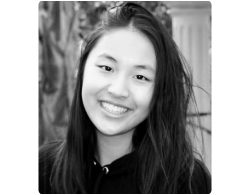 Ellen Xu hopes to inspire technical women of all ages by creating her own initiatives to uplift others. Noticing the lack of opportunities for students to participate in computing activities during the pandemic, especially for marginalized populations, she founded Elevate the Future SD, a 501(c)(3) dedicated to democratizing computer science education. The program has impacted more than 600 students across the globe with programming workshops, emerging technology summits, and speaker events. Ellen has also received support from NCWiT and DoD to teach digital forensics and introduce girls who are part of military families to careers in cybersecurity.
Ellen Xu hopes to inspire technical women of all ages by creating her own initiatives to uplift others. Noticing the lack of opportunities for students to participate in computing activities during the pandemic, especially for marginalized populations, she founded Elevate the Future SD, a 501(c)(3) dedicated to democratizing computer science education. The program has impacted more than 600 students across the globe with programming workshops, emerging technology summits, and speaker events. Ellen has also received support from NCWiT and DoD to teach digital forensics and introduce girls who are part of military families to careers in cybersecurity.
Shirley Xu
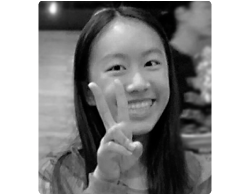 Shirley Xu founded the Volunteer Tutors Organization (VTO) and currently serves as VTO’s president and Computer Science Curriculum Director. After creating and launching the VTO website, Shirley built the staff and tutoring team and established San Diego, New York, Vancouver, New Jersey, Houston, Minnesota, and Hawaii branches. VTO specializes in many academic and extracurricular areas, including computer science and other STEM subjects. The organization has served more than 600 students in grades K-8 through one-on-one tutoring, camp programs, group lessons, class series, seminars, clubs, and other activities. The 2020 VTO Summer Camp featured an all-girls computer science teaching team.
Shirley Xu founded the Volunteer Tutors Organization (VTO) and currently serves as VTO’s president and Computer Science Curriculum Director. After creating and launching the VTO website, Shirley built the staff and tutoring team and established San Diego, New York, Vancouver, New Jersey, Houston, Minnesota, and Hawaii branches. VTO specializes in many academic and extracurricular areas, including computer science and other STEM subjects. The organization has served more than 600 students in grades K-8 through one-on-one tutoring, camp programs, group lessons, class series, seminars, clubs, and other activities. The 2020 VTO Summer Camp featured an all-girls computer science teaching team.
Sirui Xue
 Sirui Xue is a leader of Code Girls at Montgomery Blair High School. Code Girls is a fully girl-powered coding club that aims to empower girls to develop an interest in computer science and gain exposure to computer science careers. In 2019, she coordinated and hosted a Women in STEM Seminar at her school, for which eight women who work in STEM fields were invited to speak. This event provided an opportunity for female students to connect with women who work at the U.S. Army Research Lab, NASA, Walter Reed Army Institute of Research, and more.
Sirui Xue is a leader of Code Girls at Montgomery Blair High School. Code Girls is a fully girl-powered coding club that aims to empower girls to develop an interest in computer science and gain exposure to computer science careers. In 2019, she coordinated and hosted a Women in STEM Seminar at her school, for which eight women who work in STEM fields were invited to speak. This event provided an opportunity for female students to connect with women who work at the U.S. Army Research Lab, NASA, Walter Reed Army Institute of Research, and more.
Christine Zeng
 Christine Zeng established Code & Connect, a website coding program for middle-school girls and non-binary students in Michigan. The foundation of the club, creating websites to share diverse experiences and backgrounds, was envisioned as a way for students to access a welcoming computing community during the COVID-19 pandemic. Coders learned the basics of HTML and CSS and practiced their skills in small groups led by Code & Connect mentors. The program fostered not only the girls’ computing knowledge, but also their collaboration, their creativity, and most importantly, their confidence, so that they could realize their own personal potential as future leaders, coders, and creators.
Christine Zeng established Code & Connect, a website coding program for middle-school girls and non-binary students in Michigan. The foundation of the club, creating websites to share diverse experiences and backgrounds, was envisioned as a way for students to access a welcoming computing community during the COVID-19 pandemic. Coders learned the basics of HTML and CSS and practiced their skills in small groups led by Code & Connect mentors. The program fostered not only the girls’ computing knowledge, but also their collaboration, their creativity, and most importantly, their confidence, so that they could realize their own personal potential as future leaders, coders, and creators.
Amanda Zhou
 Amanda Zhou started her school’s first CyberPatriots chapter and trained a team of beginners to compete in a cybersecurity competition. When she changed schools, there was so much interest in the chapter she founded at her new school that three new teams were formed. She co-founded a computer science club so that students could have a place to sharpen their technical skills. She also initiated an outreach program to rural and high poverty schools in Mississippi which aimed to spark an interest in STEM fields through creative and visual programming and fun introductions to artificial intelligence and cybersecurity.
Amanda Zhou started her school’s first CyberPatriots chapter and trained a team of beginners to compete in a cybersecurity competition. When she changed schools, there was so much interest in the chapter she founded at her new school that three new teams were formed. She co-founded a computer science club so that students could have a place to sharpen their technical skills. She also initiated an outreach program to rural and high poverty schools in Mississippi which aimed to spark an interest in STEM fields through creative and visual programming and fun introductions to artificial intelligence and cybersecurity.